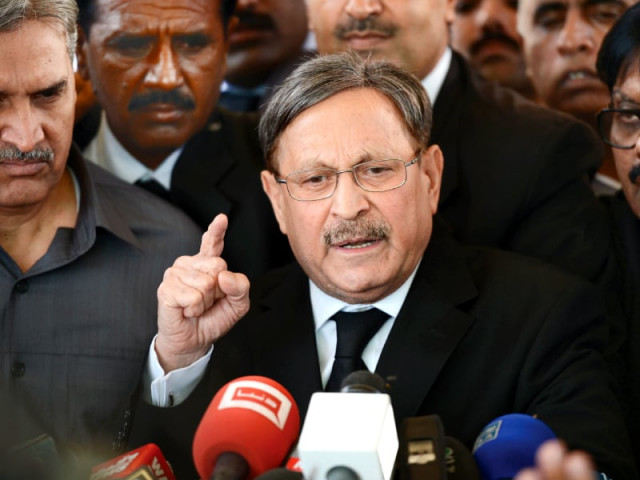NRO implementation case: Law minister wins five-day reprieve for PM
SC gives govt until Oct 10 to finalise Swiss letter draft.

The government’s legal wizard on Friday maneuvered to get a third adjournment in the NRO implementation case.
A five-judge bench of the apex court – headed by Justice Asif Saeed Khosa – had given the government until Friday (October 5) to write to the Swiss authorities asking them to reopen dormant graft cases against President Asif Ali Zardari.
However, Law Minister Farooq H Naek successfully lured the bench into exercising judicial restraint in the name of “national interest”.
Farooq Naek, a confidante of President Zardari, is aware of the status of the cases the apex court seeks to revive through its 2009 ruling on the defunct National Reconciliation Ordinance (NRO). Naek had been pursuing the cases in Swiss courts for a long time after 1997.
Before handing a third draft of the Swiss letter to the judges on Friday, Naek lectured them on the sensitivity of the case, citing “national interest”.
The bench was convinced of the changes in the first two paragraphs of the revised letter; however, it expressed concern at the last paragraph, saying that it contradicted the first two paragraphs. Contents of the letter have not been disclosed to the media.
Naek showed up to argue the case even though he was running a fever. He offered to discuss the draft of the letter with the judges in-camera. He requested a 15-minute audience with the judges in the chamber to apprise them of certain aspects of the draft.
Although the bench was hesitant about granting Naek a third opportunity to discuss the issue behind closed doors, the “national interest” mantra worked and the law minister was allowed an in-camera hearing to find out the judges’ reservations about the draft.
Justice Khosa remarked that while they were reluctant to meet in the chamber, since the issue was close to being resolved, they allowed Naek another chance. It would be dangerous to discuss the letter in the open court due to the sensitivity of the matter, he added.
After the meeting with Naek, the bench handed down a short order. “We are a few inches away from a perfect solution which upholds the dignity of courts,” announced Justice Khosa as the bench granted a five-day reprieve to Prime Minister Raja Pervaiz Ashraf for redrafting the letter.
At this stage, Naek told the bench clearly that while he would do his best in this regard, he was not making any commitment – indicating a possible tussle over the draft between the judiciary and the executive in the future.
The bench accepted his request that the government be given till October 10 to revise the draft. “In the larger interest of justice and for a proper resolution of the long-standing issue, let the hearing be adjourned till October 10 as requested by the law minister,” read the order.
Naek’s media talk
Speaking to journalists outside the court, Naek said the case was related to democracy and the incumbent government has made sacrifices for the restoration of democracy in the country.
“Our President Asif Ali Zardari stayed away from his children and his wife,” Naek said, adding that he (Zardari) was not convicted in even one case. “Who will bring back those 12 years when he could not meet his children?”
Published in The Express Tribune, October 6th, 2012.



1724319076-0/Untitled-design-(5)1724319076-0-208x130.webp)















COMMENTS
Comments are moderated and generally will be posted if they are on-topic and not abusive.
For more information, please see our Comments FAQ